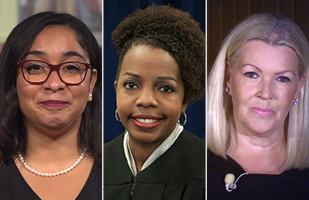Professionalism Pillars to Shape New Lawyers

A municipal judge, corporate lawyer, and managing partner are the latest to share their legal principles with newer practitioners as part of a Commission on Professionalism video series.

A municipal judge, corporate lawyer, and managing partner are the latest to share their legal principles with newer practitioners as part of a Commission on Professionalism video series.
As the law profession has evolved, the concept of legal professionalism has moved forward and grown.
Through an Ohio Supreme Court initiative, seasoned judges and lawyers are sharing their advice and insights to raise practical standards for younger attorneys.
The Supreme Court Commission on Professionalism created a video series to help lawyers better understand the expectations of practicing law.
The resource is a guide for practitioners on the best ways to conduct themselves with attorneys, jurists, and court personnel. The goal is elevating individual professional integrity to lift the entire legal system.
“Professionalism is not about what you wear or how you style your hair,” Aracely Tagliaventi, senior associate counsel for the Central Ohio Transit Authority, tells viewers in a video. “Professionalism is about treating each other with dignity and respecting each other's differences in opinion or life.”
Tagliaventi is part of the latest trio of videos championing the value of professionalism after an initial release of three recorded testimonials that includes Chief Justice Maureen O’Connor.
All the interviewees provide examples of professionalism, how it’s changed during their legal practice, and lessons they’ve learned as members of the bar.
Along with advocating for newer attorneys to pair with a mentor through such efforts as the Supreme Court’s Lawyer to Lawyer Mentoring Program, the chief justice stresses the value of growing by observing others’ experiences and absorbing constructive criticism.
“Learn how to listen. It shows respect, and it’s a skill you will use in all aspects of your life,” Chief Justice O’Connor tells viewers.
Youngstown Municipal Court Judge Carla Baldwin, the first African American woman elected to a Mahoning County bench, values a more inclusive workforce, where awareness and acceptance of differences enhance interactions.
“One thing I'm proud of is the increased diversity that you can see in the courtroom,” Judge Baldwin says. “I work hard to make sure I promote that, because our diversity makes us a stronger, richer community.”
Connections go a long way in developing a greater harmony throughout the profession due to the way relationships establish trust.
Even in a more adversarial context, such as litigation, Ellen McCarthy – managing partner at Young and McCarthy – believes decency is beneficial in the short- and long-term.
“If you're in a position to do somebody a favor, including [for] opposing counsel, don't hesitate,” McCarthy says. “It will be the best thing you’ve ever done in your practice – to be cooperative and helpful to people – because it will come back to help you.”
The Commission on Professionalism is composed of five judges, six lawyers, two law school administrators or faculty and two non-attorneys.
Commissioners are appointed by the Ohio Supreme Court, often with input from the Ohio State Bar Association and the Ohio Metropolitan Bar Association Consortium. Commissioners are appointed for three-year terms and may not serve more than two consecutive full terms.
View the current membership roster here.
Acrobat Reader is a trademark of Adobe Systems Incorporated.


